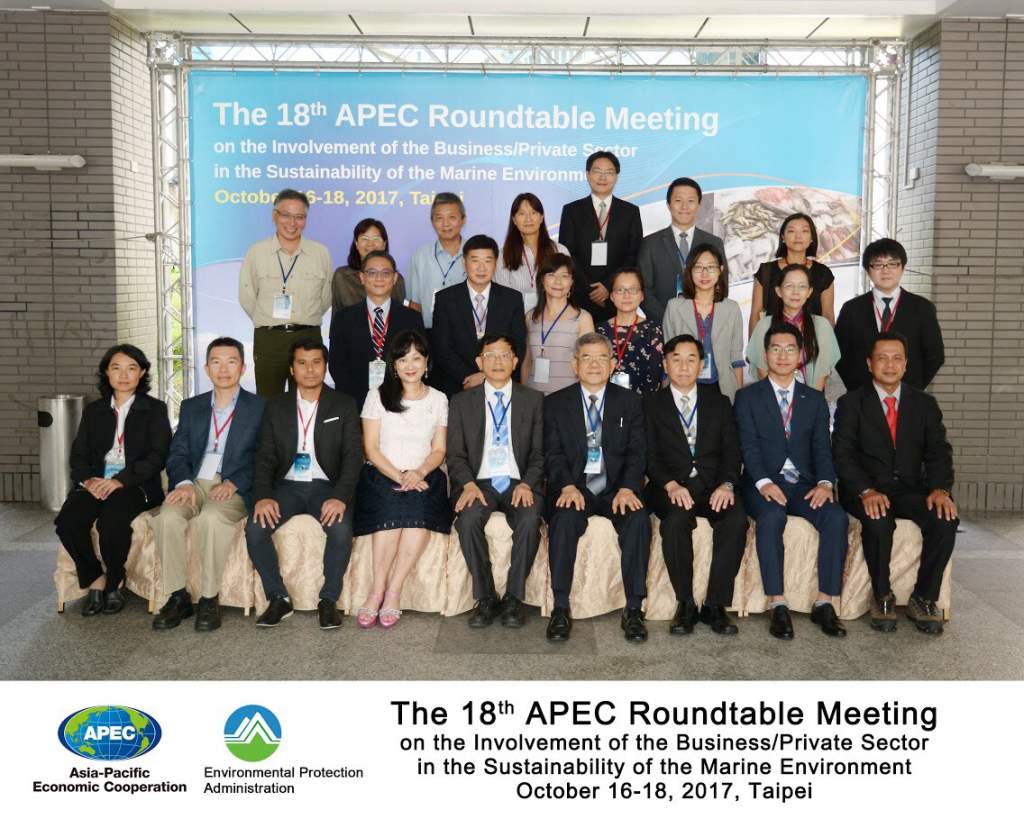Eight Asia-Pacific countries participated in the APEC Roundtable Meeting in Sustainability of the Marine Environment
Eight Asia-Pacific countries participated in the APEC Roundtable Meeting in Sustainability of the Marine Environment
Taiwan Environmental Protection Administration (EPA) held the 18th APEC Roundtable Meeting on the Involvement of Business/Private Sector in Sustainability of the Marine Environment on Oct.16-17, 2017. Participating member economies, which include Chile, China, Indonesia, Japan, Korea, Singapore, Thailand, and Taiwan, have all sent delegates to participate in the meeting.
Experts and scholars from government sectors, NGOs, and businesses discussed two major topics: Marine Environmental Protection and Food Security and Marine Resources. These deliberations enhanced joint participation between businesses and private sectors to ensure the sustainable use of marine environment and its resources.
In this year’s meeting, 16 speakers gave presentations on topics including:
1. promoting coastal environment surveillance system
2. enhancing the management of marine debris
3. recycling fishing-related debris & raising public awareness
4. the management of illegal fishing
After a comprehensive discussion, a final suggestion was proposed to the 2018 APEC Ocean and Fisheries Working Group (OFWG) meeting for future reference.
Taiwan EPA states that countries have been neglecting the conservation of the marine ecology and the sustainable use of our marine resources. The UN has listed “Conserve and sustainably use the oceans, seas and marine resources” as Goal 14 in UN Sustainable Development Goals. Taiwan EPA also regards a plastic-free ocean and reducing marine debris as the major administrative objectives. APEC is one of the most important organizations in the Asia-Pacific area. It is also one of the platforms for our country to participate in the important tasks in international affairs.
The opening address at this year’s roundtable meeting was given by Dr. Chien Hui-Chen, the Executive Secretary of the Office of Sustainable Development in EPA, and Dr. Chang Ching-Fong, the President at National Taiwan Ocean University. Both emphasized how the ocean is a vital source of food for human. Challenges such as climate change, pollution and overfishing are causing pressure on our marine resources. Only through joint efforts made by the member economies at APEC can the health of the oceans to be protected.
In this year’s meeting, delegates, who represent public& private sectors and businesses, exchanged information and experiences on the strategies to develop our marine environment and to use its resources sustainably. Through enhancing the management and protection, the objective of the sustainable use of marine fishery resources can be reached and promotes the collaborative partnership among Asia-Pacific countries to protect our marine environment.
After the two-day meeting, participants proposed specific suggestions regarding the protection of the marine environment, resources, and food security. These suggestions include:
1. Enhancing the marine surveillance system
2. Reducing marine debris and environmental hormone through joint effort
3. Suggesting collaboration between public and private sectors in reducing marine debris
4. Establishing public data platforms and implementing relevant enforcement
5. Providing economic incentives to encourage fishermen to use environmental friendly fishing nets or gears
6. Bettering environmental education in order to promote communities, fishermen, and enterprises to participate in voluntary marine environment protection programs
7. Deterring any illegal, unreported and unregulated fishing (IUU) from entering the global market
8. Strengthening marine resources management, adaptation to climate change, and marine environment protection in order to ensure food security
Taiwan EPA anticipates that through collaborative efforts made by countries in Asia-Pacific region, a harmonious relationship between human and the oceans can be established and that human can coexist with the protected marine species to share a sustainable environment.
Source: http://enews.epa.gov.tw/enews/fact_Newsdetail.asp?InputTime=1061017180414
